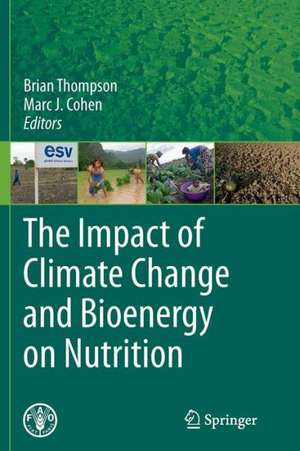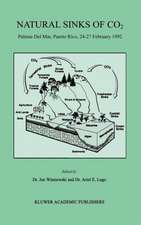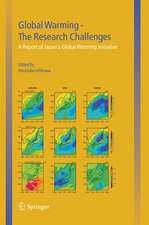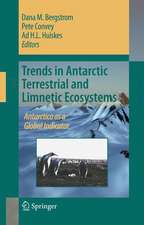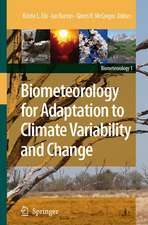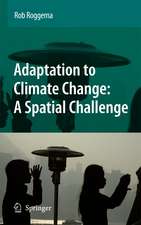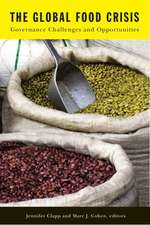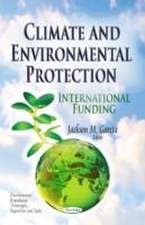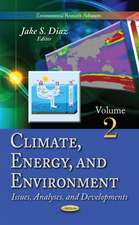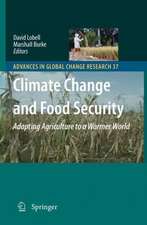The Impact of Climate Change and Bioenergy on Nutrition
Editat de Brian Thompson, Marc J. Cohenen Limba Engleză Paperback – 16 apr 2014
Although increased biofuel demand has the potential to increase incomes among producers, it can also negatively affect food and nutrition security. Land used for cultivating food crops may be diverted to biofuel production, creating food shortages and raising prices. Accelerations in unregulated or poorly regulated foreign direct investment, deforestation and unsustainable use of chemical fertilizers may also result. Biofuel production may reduce women’s control of resources, which may in turn reduce the quality of household diets. Each of these effects increases risk of poor food and nutrition security, either through decreased physical availability of food, decreased purchasing power, or increased risk of disease.
The Impact of Climate Change and Bioenergy on Nutrition articulates the links between current environmental issues and food and nutrition security. It provides a unique collection of nutrition statistics, climate change projections, biofuel scenarios and food security information under one cover which will be of interest to policymakers, academia, agronomists, food and nutrition security planners, programme implementers, health workers and all those concerned about the current challenges of climate change, energy production, hunger and malnutrition.
| Toate formatele și edițiile | Preț | Express |
|---|---|---|
| Paperback (1) | 633.53 lei 6-8 săpt. | |
| SPRINGER NETHERLANDS – 16 apr 2014 | 633.53 lei 6-8 săpt. | |
| Hardback (1) | 636.80 lei 6-8 săpt. | |
| SPRINGER NETHERLANDS – mar 2012 | 636.80 lei 6-8 săpt. |
Preț: 633.53 lei
Preț vechi: 745.32 lei
-15% Nou
Puncte Express: 950
Preț estimativ în valută:
121.22€ • 126.91$ • 100.31£
121.22€ • 126.91$ • 100.31£
Carte tipărită la comandă
Livrare economică 07-21 aprilie
Preluare comenzi: 021 569.72.76
Specificații
ISBN-13: 9789400792890
ISBN-10: 9400792891
Pagini: 120
Ilustrații: XVI, 120 p.
Dimensiuni: 155 x 235 x 10 mm
Greutate: 0.23 kg
Ediția:2012
Editura: SPRINGER NETHERLANDS
Colecția Springer
Locul publicării:Dordrecht, Netherlands
ISBN-10: 9400792891
Pagini: 120
Ilustrații: XVI, 120 p.
Dimensiuni: 155 x 235 x 10 mm
Greutate: 0.23 kg
Ediția:2012
Editura: SPRINGER NETHERLANDS
Colecția Springer
Locul publicării:Dordrecht, Netherlands
Public țintă
GraduateCuprins
1. Summary.- 2. Introduction.- 3.World Food Insecurity and Malnutrition: Scope, Trends, Causes and Consequences.- 4. Climate Change, Food Security and Nutrition.- 5. Nutrition and Bioenergy.- 6. Policies and Programmes for Improving Nutrition.- 7. Conclusions and Recommendations.- 8. References.- 9. Appendices.
Textul de pe ultima copertă
Climate changes will affect food production in a number of ways. Crop yields, aquatic populations and forest productivity will decline, invasive insect and plant species will proliferate and desertification, soil salinization and water stress will increase. Each of these impacts will decrease food and nutrition security, primarily by reducing access to and availability of food, and also by increasing the risk of infectious disease.
Although increased biofuel demand has the potential to increase incomes among producers, it can also negatively affect food and nutrition security. Land used for cultivating food crops may be diverted to biofuel production, creating food shortages and raising prices. Accelerations in unregulated or poorly regulated foreign direct investment, deforestation and unsustainable use of chemical fertilizers may also result. Biofuel production may reduce women’s control of resources, which may in turn reduce the quality of household diets. Each of these effects increases risk of poor food and nutrition security, either through decreased physical availability of food, decreased purchasing power, or increased risk of disease.
The Impact of Climate Change and Bioenergy on Nutrition articulates the links between current environmental issues and food and nutrition security. It provides a unique collection of nutrition statistics, climate change projections, biofuel scenarios and food security information under one cover which will be of interest to policymakers, academia, agronomists, food and nutrition security planners, programme implementers, health workers and all those concerned about the current challenges of climate change, energy production, hunger and malnutrition.
Although increased biofuel demand has the potential to increase incomes among producers, it can also negatively affect food and nutrition security. Land used for cultivating food crops may be diverted to biofuel production, creating food shortages and raising prices. Accelerations in unregulated or poorly regulated foreign direct investment, deforestation and unsustainable use of chemical fertilizers may also result. Biofuel production may reduce women’s control of resources, which may in turn reduce the quality of household diets. Each of these effects increases risk of poor food and nutrition security, either through decreased physical availability of food, decreased purchasing power, or increased risk of disease.
The Impact of Climate Change and Bioenergy on Nutrition articulates the links between current environmental issues and food and nutrition security. It provides a unique collection of nutrition statistics, climate change projections, biofuel scenarios and food security information under one cover which will be of interest to policymakers, academia, agronomists, food and nutrition security planners, programme implementers, health workers and all those concerned about the current challenges of climate change, energy production, hunger and malnutrition.
Caracteristici
The only book that looks at the effects of climate change, bioenergy, and the economic crises of 2007-2010 on food and nutrition security. The only book to provide current statistics on nutrition, climate change projections, biofuel scenarios and food security together in a single source. Provides explicit examples of adaptation and mitigation strategies for climate change and biofuel production within the agricultural sector
